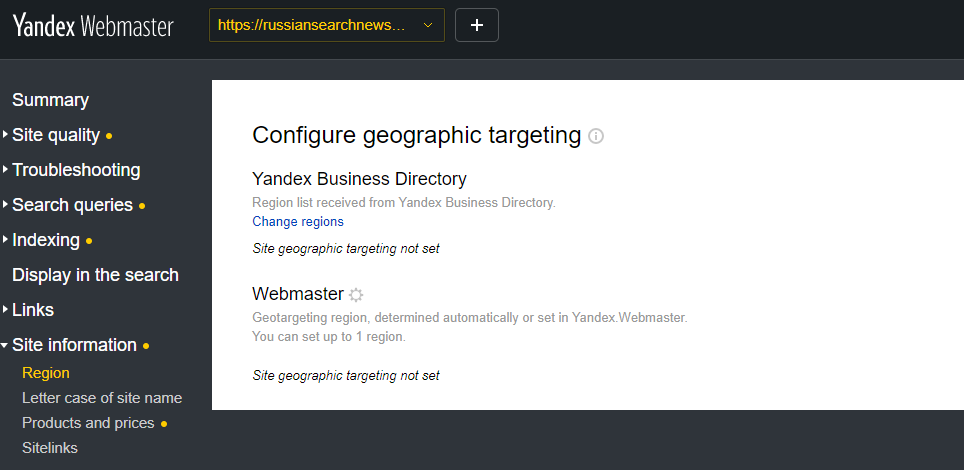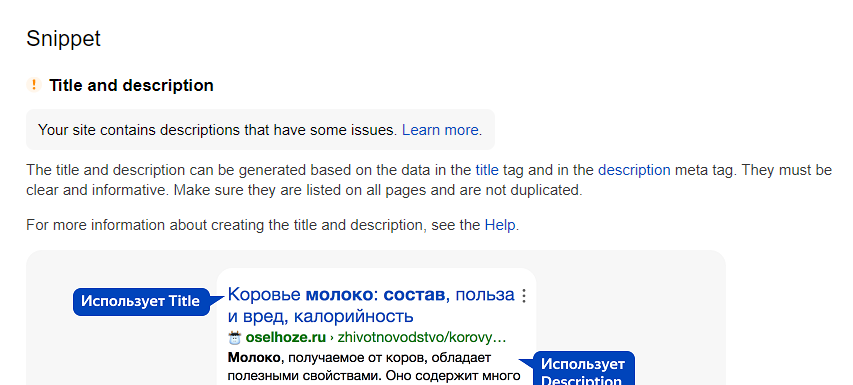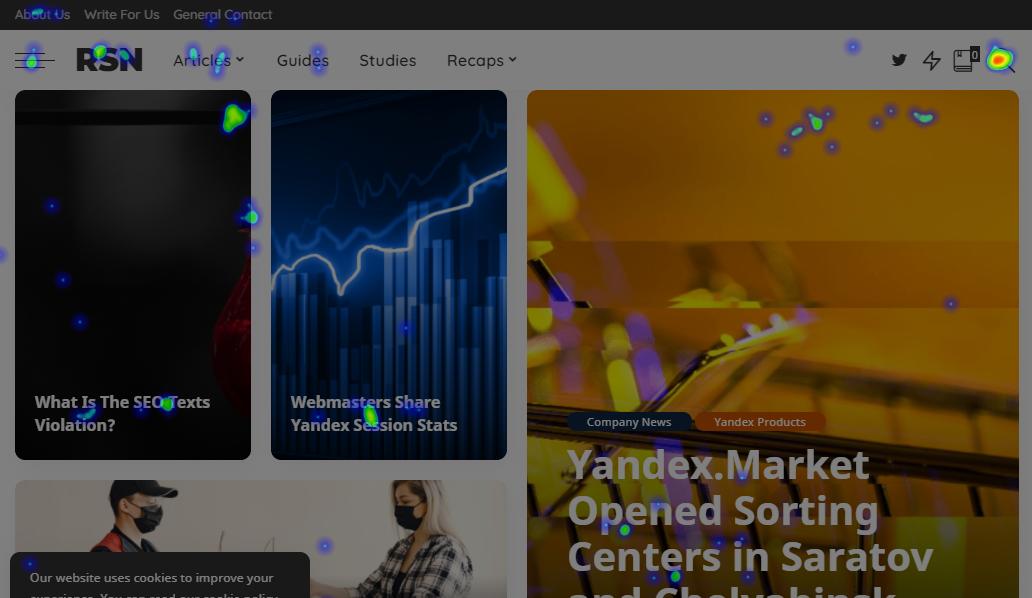At the time of writing, Yandex holds a 44% market share in Russia (for search) in comparison to Google’s 53%, making this one of the closest battlegrounds that Google has for supremacy.
Yandex is much more than a search engine, however. It has diversified over the last two decades to become a consumer tech company. Today, Yandex is branching out further into personal and business finance, and grocery delivery.
Because of this, and for the purposes of this article, I’m only going to compare Yandex’s search product (and products directly associated with website performance) versus Google Search.
The fundamentals of good SEO for Google can also be applied to Yandex.
However, there are some key differences in how Yandex handles certain technologies and the expectations you should have as a result.
Technical SEO Differences
Let’s take a look at some of the important differences between Google and Yandex when it comes to technical SEO.
Search engines have the ability to discover, crawl, and render a website’s content. It is then processed, scored, and weighed against other documents, then ranked and displayed on search results pages accordingly.
For the most part, Google and Yandex are very similar in how they process the technical elements of a website. Still, there are some unique differences that need to be considered when optimizing for the RuNet.
1. JavaScript
Unlike Google, Yandex has difficulties crawling and indexing JavaScript websites. Single-page applications purely developed in JavaScript and not pre-rendered (or dynamically rendered) won’t get indexed for Yandex.
Yandex confused the issue when it announced the Vega algorithm update towards the end of 2019. In the same press release, the company talked about pre-rendering search results for mobile users.
This has been mistaken by some as Yandex pre-rendering websites themselves for search purposes.
In reality, Yandex is actually using AI to better predict the user query and pre-fetch and pre-load relevant search results pages, to reduce user friction when using the search service.
2. AMP vs Turbo
Whilst Google has AMP, Yandex has Turbo. The reception from Russia’s SEO community as to the need for Turbo is comparable, with voices from both corners making good cases as to whether or not they are needed.
When Turbo pages were first launched, they were described by Webmasters as being restrictive and “a toy” for content websites.
Over recent years, however, they have improved to support greater customization, adverts, and ecommerce functionality (with multiple payment options). Turbo pages also contribute to a visible site “quality mark” within search results pages — more on that in a minute.
3. Site Region Targeting
Like Google, Yandex has algorithms and considerations for search queries with local intent or, as Yandex defines them, geo-dependent queries.
Given the size of Russia, this is important for user satisfaction.
Yandex recommends (strongly) that certain website types use a “regional binding” setting within Yandex Webmaster Tools to both help Yandex show them in the correct SERP geo-locations and also ensure they get seen by their target user base.
 Yandex Webmaster Tools – Setting site region binding
Yandex Webmaster Tools – Setting site region bindingYandex recommends that general article/content websites without a regional focus (such as with the example in the image above) don’t require a regional binding.
However, websites that focus on regional or location-specific topics, such as newspapers and some magazines or websites offering products or services that don’t have national fulfillment, should specify the regions in which they operate.
Noteworthy Mention: Hreflang
If I had written this article a year ago, I would have highlighted that Yandex didn’t support hreflang via XML sitemaps.
In August 2020, however, we saw changes to Yandex webmaster documentation on internationalization support and a new section covering XML sitemap hreflang.
This now means that Yandex has the same hreflang support capabilities as Google.
Webmaster Tools vs. Search Console
A few years ago, Yandex’s Webmaster Tools was fairly limited. But in recent years, the Yandex team has invested heavily in the platform.
Here are some of the key differences which can help you monitor, index, and gain further insight into how your campaigns are performing across Yandex organic search.
4. Active URL Monitoring
One really useful feature in Yandex Webmaster Tools is the ability to actively monitor up to 100 URLs on your site.
 Important page monitoring, natively in Yandex Webmaster Tools
Important page monitoring, natively in Yandex Webmaster ToolsThis feature updates automatically, and you can specify which URLs you want to track.
It will tell you the current page status, which version of the page is being shown in results (cached v last crawled), and the last indexed date.
In the image above, the bottom URL was last indexed on April 17th, returned a 200, and this version is being used in search results.
Coupled with crawl stat reporting (which is available in Yandex WMT), you can determine when your updated content is both reindexed and then served to users.
5. Quality Mark Badges
Google has tested displaying icons in the SERPs for the upcoming Page Speed experience update.
Whilst this is new for Google, Yandex (and Baidu) have been displaying icons within search results for some time.
Yandex has 16 icons known as site quality indicators that it can choose to display.
Some of these can be achieved through technical setups, such as the Turbo page badge.
Others, such as the Popular site badge, rely on the website achieving a high enough score in the SQI (Site Quality Index), which is calculated from a myriad of factors including:
- The size of the website’s audience.
- The estimated level of user satisfaction (behavioral signals).
- How much trust Yandex themselves place in the site (inferred EAT signals).
There are a number of other factors, and it is worth noting that because Yandex relies on user behavior signals for a number of its algorithms and quality determinations, it has become great at working out if marketers are trying to artificially game the system.
In its documentation, Yandex says that “SQI values can be reset, or removed for a website if they see attempts to influence the score.”
Also, with all algorithmic punishments, Yandex clarifies that:
“Yandex does not comment on the changes in this indicator and provides no guarantees or dates for its recovery.”
6. Special Content Result Block Breakdowns
Like Google, Yandex has a number of special content result blocks and snippets it can use to augment search results page.
However, unlike Google, in Yandex Webmaster Tools you can see your eligibility for three different special result types and eleven snippet result types. This highlights where there are specific issues preventing your eligibility.

Noteworthy Mention: Indexing Speeds
A lot of Yandex vs. Google articles from recent years highlight that Yandex is oftentimes slower to index a website.
Anecdotally, this hasn’t been the case for the past two years. With indexing open, Yandex will assign a crawl tier to your site and proceed to index accordingly.
Algorithmic Differences
For the most part, many of Yandex’s algorithms are in line with Google’s and have the same objectives.
There are, however, two distinct differences you should be aware of.
7. Behavioral Factors
Whilst there is some debate as to how Google utilizes user behavior signals (and to what extent) as part of its algorithms, Yandex’s stance is much more monochrome.
Yandex does factor in user signals.
User signals and CTRs from SERPs can be used to determine:
- Positioning within the SQI (Site Quality Index), contributing to the award of quality mark badges.
- Positioning of results within search engine results pages.
As a result, Yandex has measures in place to identify any gaming or cheating in user behavior metrics. Marketers and SEO pros can access tools through Metrica to better analyze user happiness (more on this further down the article).
Further to this, Yandex recommends that you regularly analyze your web server logs. Pay special attention to:
- Traffic sources: Understand which sources bring the most visitors to your website.
- Search queries: Analyze which queries bring visitors to your site.
- Target pages: Measure conversions on pages like shopping carts and forms.
- Platform specs: Figure out what platforms users use to find you and optimize for a better on-site experience.
8. ICS (or IKS) Score
A Yandex ICS score is a way of evaluating the quality of a website. It takes into account factors such as the number of visits, user’s time on site, and clicks on ads.
These are combined with human-completed surveys about the content’s accuracy and readability to produce a final score.
When you search for something from within Russia, you will see the top results given 1 to 100 grades depending on how useful they are considered by Yandex users and other criteria suggested below.
If a website scores below a certain threshold, its ranking will be lowered.
Yandex Metrica vs Google Analytics
Yandex’s version of Google Analytics, Metrica, has a lot of the same reports and functionality as Google Analytics.
There are, however, some great tools that can provide helpful insights into how users are interacting with your content, as well as your website’s performance rates.
9. User Retention
Whilst better cohort analysis and user retention rates are being introduced in GA4, Metrica has had this for a while.
In Metrica, you can quickly see a breakdown of users by session and goal completions.
 In Metrica, you can see user engagement at a granular, anonymized level.
In Metrica, you can see user engagement at a granular, anonymized level.This level of data out-of-the-box is particularly helpful when building personas and planning content around user journeys. It’s also useful for helping to rectify any preconceived misconceptions around how users will interact with the website.
10. Heat Maps
Another great feature in Yandex Metrica that differs from Google Analytics is the ability to view user heatmaps.
 Out of the box user heatmaps in Yandex Metrica
Out of the box user heatmaps in Yandex MetricaAs this feature is combined with analytics, on the heatmap directly you can:
- Compare custom segments (e.g. organic users v social users).
- Change date ranges.
- Add session criteria (e.g. more than 30 seconds, 2+ pages viewed).
The built-in toolbar also gives you insight into above-the-fold vs below-the-fold metrics.
For example, in the above screenshot, we can see that 55.9% of clicks on the homepage (over the past quarter) have been on the links visible on page load.
Community Support Differences
Finally, another big difference between Google and Yandex is how they engage with their SEO communities.
With Google, we have John Mueller, Daniel Waisberg, Martin Splitt, and Gary Illyes there to field random questions and offer support and insight into webmaster problems.
Yandex however doesn’t have an individual or set of individuals to which queries can be directed.
Instead, they have a technical support service team, each member of whom uses the same public pen name, Plato Schukin.
If you’re looking to reach a Russian-speaking audience, Yandex is the way to go. As you can see, there are some peculiarities to keep in mind yet overall, the optimization principles seem to be universal.
Companies looking to expand their reach on an international level would do well to optimize their content for search engines outside of Google, especially in countries where other platforms are more popular.
As long as you prioritize quality content a great user experience, you’re sure to do well abroad.
More Resources:
- The Ultimate Guide to Yandex SEO
- Meet the 7 Most Popular Search Engines in the World
- How Search Engines Work
Image Credits
All screenshots taken by author, April 2021





